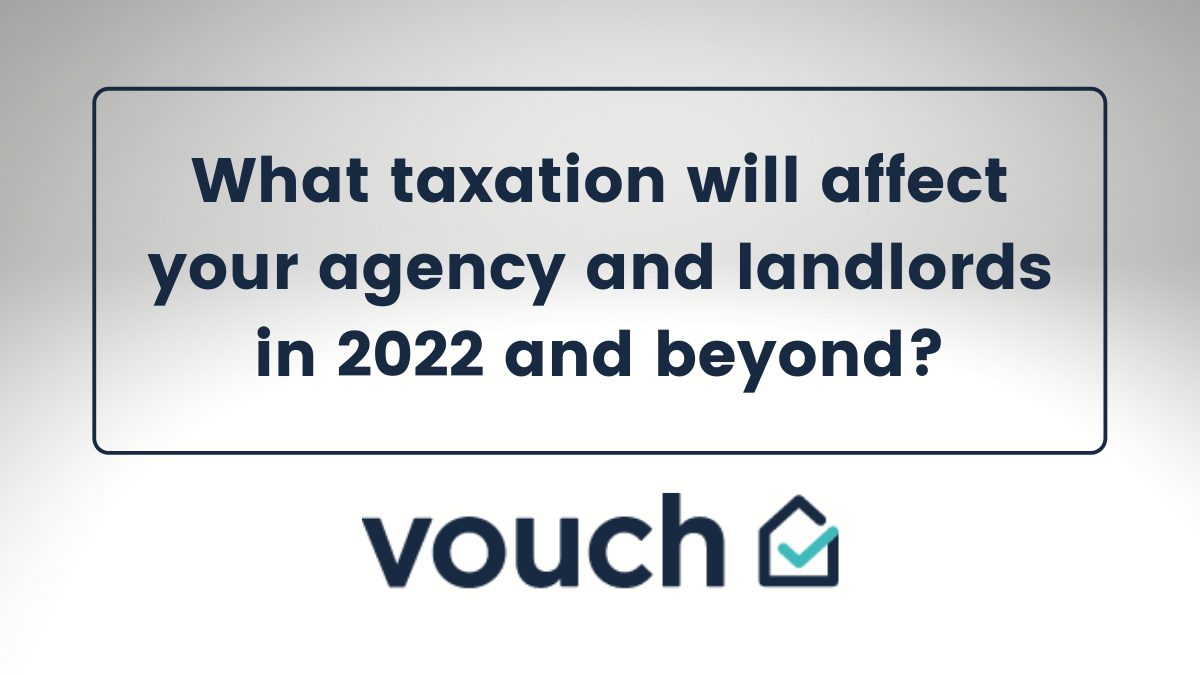Tax is a hot topic in lettings in 2022. Jaime Tillyer, Director at Vouch, shares her thoughts on how past tax changes, upcoming deadlines, and future proposals may affect your agency and landlords.
The topic of tax is already looming large in the lettings sector in 2022. Landlords have had it tough in recent years, with changes to mortgage interest relief impacting the profitability of rental property investments. The housing crisis has spurred policy makers and campaigners to look to tax-based solutions, and investor behaviour has shifted as landlords pivot to pick up on new opportunities, with the support of their estate and letting agents.
The short-term lets tax clampdown
Second homeowners renting out their properties short term will need to meet more stringent criteria around the number of days they are let out to benefit from business rates from April 2023. This aims to help up the supply of properties for long-term let.
Agents may see more second-home properties come back on the market from those homeowners that will now be required to pay council tax, rather than benefit from small business rate relief. However, Propertymark's Daryl McIntosh says that these new rules don't go far enough and that more is required "to make the regulatory burden placed on private rented sector landlords relatively less of a disincentive to remain in the sector."
Stamp duty reform on the horizon?
The stamp duty holiday is over but, if anything, the topic of stamp duty is becoming more prevalent in the property industry. Firstly, the holiday has had a lasting effect on the market, with house prices still continuing to climb according to the latest figures from the Office of National Statistics.
Second, there are calls for this tax to be reformed, to help bolster the number of long-term rented homes. Closing the loophole on short-term let properties, as outlined above, is a step in the right direction, but MP Tim Farron says that "the additional three per cent [stamp duty surcharge on second homes] is actually a barrier to investment for much needed homes in the private rented sector" - a sentiment echoed by Timothy Douglas, Head of Policy and Campaigns at Propertymark. If this message convinces policy makers to make a change, we may see investments in buy-to-let properties surge.
Growth in landlords as limited companies
2021 was the year that savvy landlords created 47,400 to buy-to-let limited companies to maximise their profits, according to Hampton's research, up 14 percent on 2020 figures. The uptick in the number of companies created aligns with the mini-property boom around the stamp duty holiday as investors rushed to take advantage while they could of the reduced rates.
Aneisha Beveridge, Head of Research at the estate and letting agency, shares that: "The growth in buy-to-let businesses has come from smaller landlords rather than larger institutions who made up most buy-to-let company owners pre-2016."
This is an interesting shift, demonstrating that more landlords with small portfolios are taking advantage of the tax relief that they see when creating this separate legal entity, paying corporation tax, rather than income tax. Creating a limited company is not a magical solution that alleviates all tax pressures, however. Recent reports predict that increases to the basic rate of dividend tax could also increase tax payments for landlords operating under a limited company structure.
Deadlines approaching for Making Tax Digital
Making Tax Digital will affect agents and landlords alike, aiming to "eliminate common errors and save time" with a shift to fully digitised record-keeping and submission processes. From 1 April 2022, agents and landlords will need to meet new digital requirements for VAT-returns.
This year, the government has waived late filing and payment penalties by a month for self-assessment tax returns, acknowledging the impact of Covid-19 on businesses - but, from 6 April 2024, this process will also fall under the new rules, requiring digital records and filing returns using relevant software. Corporation tax will then follow in the years to come.
Agents that have already embraced technology should see this as simply another opportunity to do things faster and more efficiently. Those agents can then demonstrate their new expertise to landlords and, voila - you'll have a new way to stand out from your competition, advising on how landlords can digitise their tax records.
No big Capital Gains Tax changes
Landlords across the country will have breathed a sigh of relief when Sunak announced that he wouldn't be making any major changes to capital gains tax (CGT) in his Autumn 2021 budget. Landlords feared that he would align it more with income tax, which would negatively affect the returns of those selling assets such as second homes. This is a reprieve for landlords who have come to expect the worst from tax changes - and there was even the bonus of more time for landlords selling up to then pay the CGT, from within 30 to 60 days.
Will this tax move back into the government's crosshairs in the future? Or will the lack of housing stock available for long-term let dissuade the government from introducing further measures that deter landlords from the market?
A stamp duty tax on tenants
Finally, a tax curve ball recently brought to light, that will likely only affect only a small pool of landlords. Tenants with cumulative rent that's built up to £125,000 on a renewing tenancy contract are liable to pay one percent of that rent value as stamp duty tax.
Your agency's landlords may not deal with rents at these lofty levels normally, but as tenants in high value markets stay in one property for longer, it may become an extra saving for your landlords that they've not previously considered.
Visit the vouch landing page on Kerfuffle for more information and to see reviews



